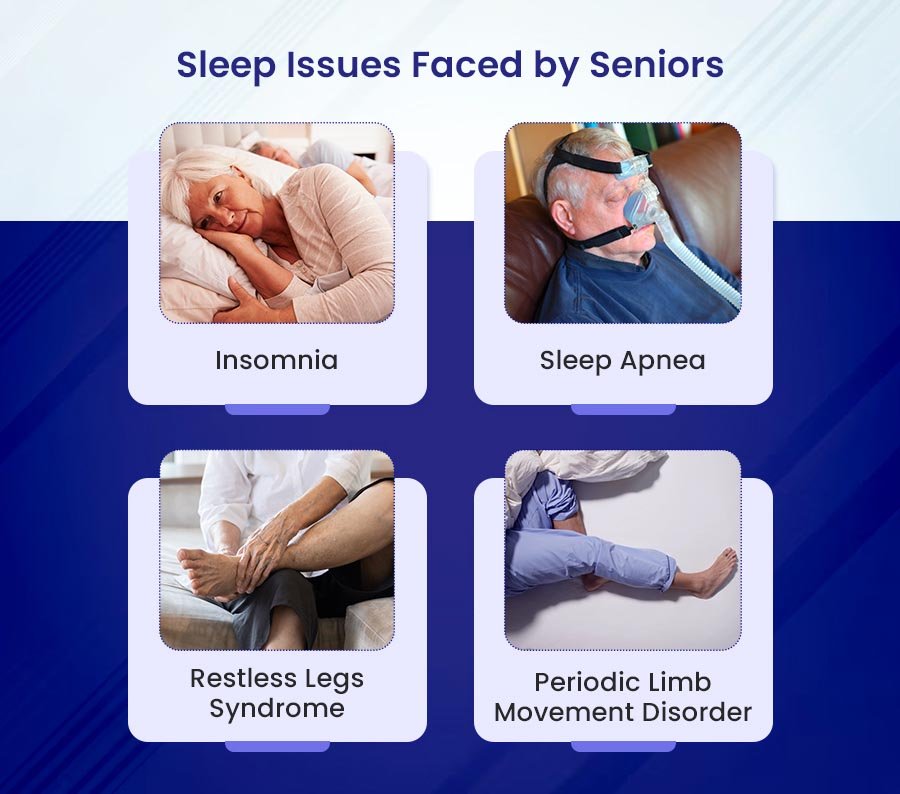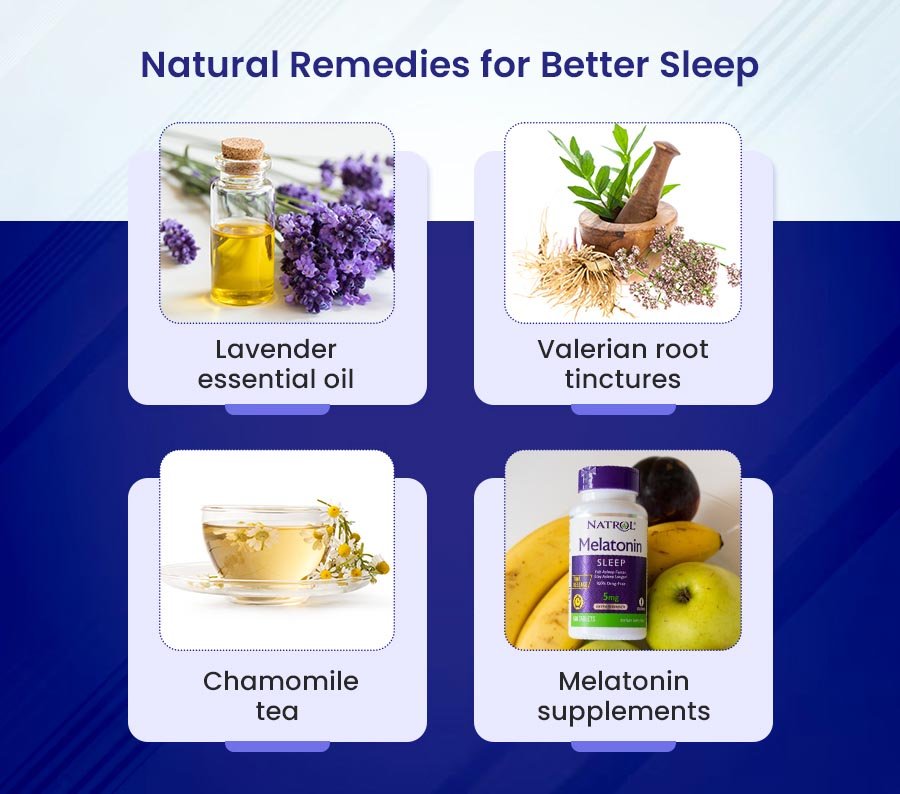Having a good night’s sleep is vital to maintain overall health and well-being. Adequate sleep enhances memory consolidation, promotes immune system function, regulates mood, and improves cognitive performance. Unfortunately, many individuals, particularly seniors, often encounter obstacles when achieving a good night’s sleep.
One of the primary challenges seniors’ faces is age-related changes in sleep patterns. As individuals grow older, their sleep tends to become lighter and more fragmented, leading to difficulties in falling asleep and staying asleep throughout the night. Also, chronic pain, sleep apnea, and restless legs syndrome can further disrupt sleep.
In this blog post, we will explore the importance of sleep for seniors, discuss their challenges in achieving quality sleep, and highlight the benefits of natural remedies to help them sleep better.
Table of Contents
Sleep Issues in Seniors

1. Insomnia
Insomnia, the most common sleep disorder among seniors, poses challenges in falling asleep and staying asleep. Research indicates that approximately 50% of older adults struggle with initiating or maintaining sleep. Seniors with insomnia may experience daytime fatigue, decreased concentration, and mood disturbances. Insomnia can be caused by a combination of factors, including age-related changes in sleep patterns, underlying medical conditions, medications, and psychological factors such as stress or anxiety.
2. Sleep Apnea
Another common sleep disorder found in seniors is sleep apnea. It is characterized by pauses in breathing during sleep. Sleep apnea can cause frequent awakenings throughout the night, loud snoring, and excessive daytime sleepiness. Seniors with sleep apnea are at increased risk of cardiovascular problems, stroke, and cognitive impairment.
3. Restless Legs Syndrome (RLS)
RLS is a neurological disorder characterized by unpleasant sensations in the legs and an irresistible urge to move them. Symptoms typically worsen at night, leading to difficulty falling asleep. RLS can be a primary condition or occur secondary to other medical conditions such as iron deficiency, kidney disease, or neuropathy.
4. Periodic Limb Movement Disorder (PLMD)
PLMD is a sleep disorder characterized by involuntary and repetitive movements of the legs or arms during sleep. These movements can disrupt sleep and lead to excessive daytime sleepiness. PLMD can occur independently or coexist with other sleep disorders, such as restless legs syndrome.
The causes of sleep issues in seniors can be multifactorial, such as:
Age-Related Changes
Medical Conditions
Certain Medications
Lifestyle Factors
Addressing sleep problems in seniors is of paramount importance for their overall well-being. Quality sleep is crucial for physical health, cognitive function, emotional well-being, and maintaining an active lifestyle. By addressing sleep issues, seniors can experience improved energy levels, enhanced memory and concentration, reduced risk of chronic conditions, and better emotional resilience.
Natural Aids for Promoting Sleep
Though natural remedies have promise in promoting better sleep for seniors. It is wise to consult with primary care physicians at Elite Health Care Centers to ensure that natural remedies align with individual health conditions and medications. Some of the natural sleep aids are as follows:

1. Lavender
Lavender is a fragrant herb known for its calming properties. The lavender scent has been used for centuries to promote relaxation, improve sleep quality, and reduce anxiety. Research suggests that inhaling lavender essential oil or using its infused products before bedtime can help induce relaxation, lower blood pressure, and promote better sleep quality. Seniors can incorporate lavender by using essential oil in a diffuser, applying it topically (properly diluted), or using lavender-scented pillows or sprays.
2. Valerian Root
Valerian root contains compounds that interact with the brain’s GABA receptors, promoting relaxation and reducing anxiety. It has been shown to improve sleep quality and reduce the time to fall asleep, making it an effective natural remedy for seniors experiencing sleep disturbances. It is available in various forms, including capsules, tea, or tinctures. Seniors should consult with their primary care physician or a senior care services professional before using valerian root, especially if they take other medications, as they may interact with certain drugs.
3. Chamomile
Chamomile tea is known for its soothing effects and potential sleep-promoting properties. It contains compounds that bind to GABA receptors in the brain, producing a mild sedative effect. Seniors can enjoy a warm cup of chamomile tea before bedtime to help them relax, reduce anxiety, and prepare for rest. Chamomile is generally safe and well-tolerated, but it is important to note that individuals with allergies to plants in the daisy family should exercise caution.
4. Melatonin
Melatonin is a hormone naturally produced by the body, primarily in the pineal gland, and plays a vital role in regulating the sleep-wake cycle. Melatonin levels naturally increase in the evening, signaling the body to prepare for sleep. However, melatonin production can decline with age, causing sleep disturbance patterns. Supplementing with melatonin can help regulate sleep patterns and improve sleep quality, especially for individuals with disrupted circadian rhythms. Melatonin should be used under the guidance of a healthcare provider professional or a healthcare clinic specializing in senior care services to determine the appropriate dosage and timing of melatonin supplementation and to ensure no interactions with existing medications.
Lifestyle Changes to Improve Sleep
In addition to natural remedies, implementing certain lifestyle changes can significantly enhance sleep quality for seniors. Some key factors that can contribute to better sleep are as follows:
Regular exercise
Exercise helps reduce stress, increase the production of endorphins, and promote overall physical and mental well-being. Seniors should aim for moderate-intensity activities such as walking, swimming, or yoga. However, completing exercise sessions at least a few hours before bedtime is important, as exercising too close to bedtime can have an energizing effect, making it harder to fall asleep.
Sleep environment
Creating a comfortable and sleep-friendly bedroom environment is essential for promoting quality sleep. To achieve this, it is important to ensure the bedroom is quiet, dark, and cool. Investing in comfortable mattresses, pillows, and bedding that provide adequate support can significantly enhance sleep comfort. Consider using room-darkening curtains or an eye mask to block out unwanted light. Additionally, minimizing external distractions such as electronic devices, televisions, or work-related materials can help create a peaceful atmosphere in the bedroom.
Sleep hygiene practices
Good sleep hygiene practices are essential for seniors to establish and maintain a consistent and restful sleep routine. This includes maintaining a regular sleep schedule, even on weekends, to promote a stable sleep-wake cycle. It is also important to avoid stimulating activities, such as consuming caffeine or nicotine, close to bedtime. Engaging in a pre-sleep routine incorporating relaxing activities like reading, a warm bath, or practicing deep breathing and meditation can help signal the body to wind down. Creating a calm and peaceful atmosphere in the bedroom by dimming lights, listening to soothing music, or engaging in light stretching exercises. If sleep issues persist or worsen, seeking online doctor consultation or visiting a medical clinic specializing in sleep disorders is advisable for further evaluation and guidance.
Light exposure
Light exposure is vital in regulating the sleep-wake cycle, or circadian rhythm. Seniors can optimize their sleep-wake cycle by exposure to natural light during the day, especially in the morning. This can be achieved by walking outside or opening curtains to allow sunlight into the living space. In the evening, it is equally important to minimize exposure to bright artificial light, particularly blue light emitted by electronic devices like smartphones, tablets, and computers. Blue light can disrupt the body’s melatonin production, making it more difficult to fall asleep.
If sleep issues persist or worsen, it is advisable to consult with healthcare professionals, such as online doctor consultation, or visit a healthcare clinic specializing in sleep disorders, for further evaluation and guidance.
Bottom Line
Seniors must consult with healthcare professionals, such as those at health care centers, to ensure personalized advice and guidance. Primary care physicians can offer expertise and tailor recommendations based on individual needs, considering factors such as existing health conditions and medications. Additionally, seniors are encouraged to prioritize their sleep and consider scheduling an annual or routine physical exam to address any underlying health concerns affecting their sleep.
By combining natural remedies, lifestyle changes, and professional guidance, seniors can improve their sleep quality and overall well-being.










